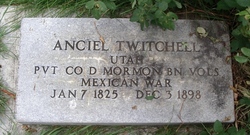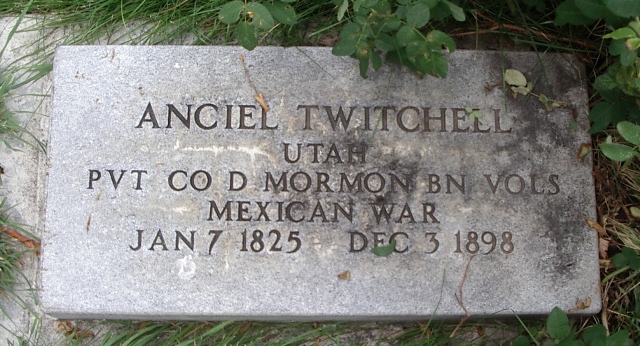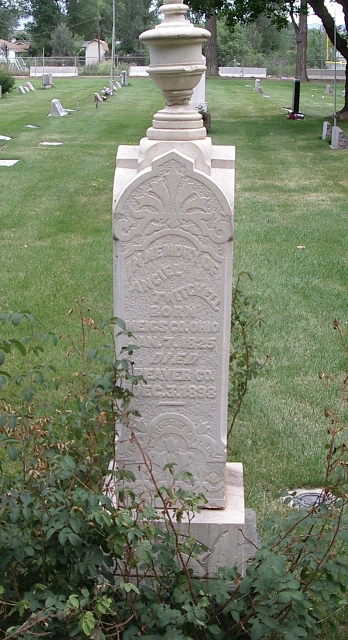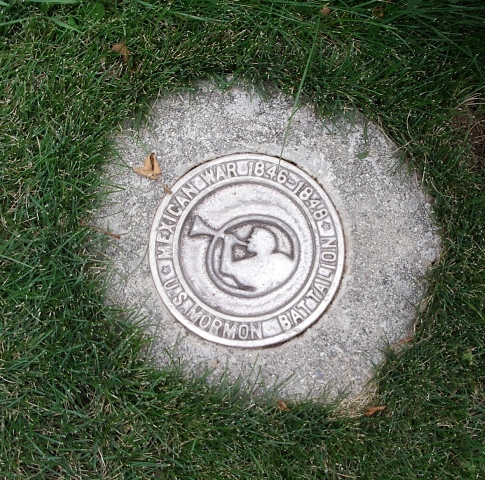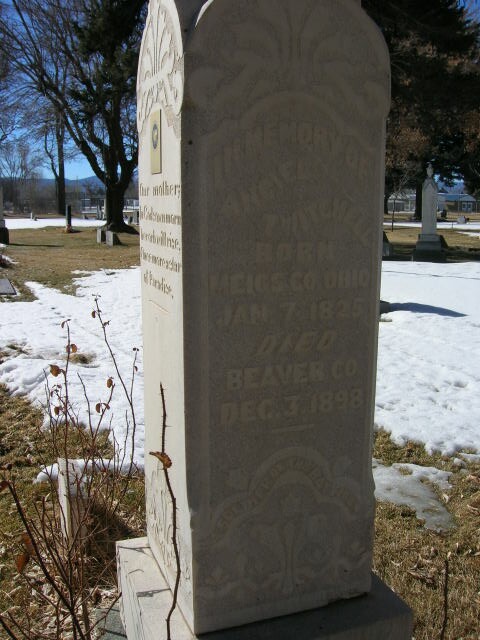Married Louisa Samantha Hitchcock, 7 Oct 1844, Nauvoo, Hancock, Illinois
Anciel Twitchell, son of Phebe Melisa Knight and Ephraim Twitchell, was born in Bedford, Meigs, Ohio, 7 January 1825. In the early 30's the family moved to Missouri, then to Illinois. Anciel married Louisa Samantha Hitchcock, 7 October 1844. She lived in Nauvoo at the time but was born in Rochester, New York, 5 Jun 1828, the daughter of Seth Hitchcock and Sarah Ann Rhoades. Their first child, Ephraim, was born 10 October 1845 at Nauvoo, died 9 September 1846 at Pottawattamie, Iowa. Here Anciel and his father put in crops of potatoes and corn and had a group of shoats [young pigs] to raise. These crops and animals saved many saints, for Ephraim made three trips to take theses supplies to the saints.
The war with Mexico having been declared, Anciel joined the Mormon Battalion and began the longest march in history. He was under General Sterling Price. They marched to
Fort Leavenworth to receive their supplies. From there they marched to Pueblo, Sante Fe, Fort Tucson, San Diego and Los Angeles (about 2,000 miles) before being discharged a year later. Anciel sent word for his father to bring all the families to join him, for this was the place to live.
After Anciel left with the Mormon Battalion, Ephraim, his father, and their families joined the Ezra Chase Company and made the trip to Ogden, Utah where Ephraim built a
home to settle in, but the Church called him to go further south. They had received word from Anciel and decided to go as far south before winter as they could and join with Anciel and make this the last move. But the trip was the hardest journey they had made, for in the crossing of the Humbolt River in Nevada they had to make rawhide lariats and pull the wagons in boats to float them across. They had to swim the stock over and the water was icy cold. When they reached the mountain pass, they traveled on top of the snow as if it was cement. At the summit they found a party that had perished before them. They used parts from the wagons and some supplies to supplement what they had lost at the river and when they arrived in the valley, Ephriam went to work at Sutter's Mill [in California] to buy more supplies and he was offered a large sum of money to remain with them as a builder, but he wanted to find Anciel so he continued.
In saving the gold, Anciel and James had melted the gold into slugs which they placed about their waist and kept with them always. A Mexican bandit, Joquin, escaped from the Stockade. He had gathered a dozen men and came to where Anciel, James and Ephraim were. They saw him coming and Ephraim jumped on the big black stallion Anciel had bought and mounted a knoll where he could over see the area. Anciel and James hid themselves in the boulders but had the guns pointed directly at Jouquin who stopped, seeing the situation was not to his liking, put spurs to his horse and fled. His men followed.
Anciel and James decided to go make a payment of the gold on the Spanish Land Grant so they gave up the mine and started to build homes, corrals and to gather the wild native stock. They built on the ocean front in a beautiful setting and a home was built for each family in the group. They were happy in raising the American Flag they had made and were at home. But this was not to be, for the wind brought in a hurricane and, while the people only had time to flee to higher ground, the wind and storm took the corrals, stock and homes out into the ocean. When they returned, debris was all around, but nothing of value. A stranger passing told them to return to Utah where the body of the Saints were. Ephraim said "My boys will not go with me." The stranger replied, 'Yes, they will, every one of them," He was correct, for they all returned.
After they had traveled for some time, they discovered that the stranger had left his cape in the wagon. It was kept as a heirloom in my Grandmother's chest. I used to visualize the stories as my Grandfather told them to me and I used to put the cape on. He also told me that Anciel and James had buried the deed to the Land Grant on the property where one could find it if they decided to ever return and where the weather would not destroy it.
In 1857, the Twitchell's returned to Utah and settled at Beaver. Anciel built a ranch and kilns to bake brick to build homes. He and his sons in Beaver used to make brick and build homes and they ranched. He was a farmer and followed various agricultural pursuits during the remainder of his life. They sold stock to the Army and to the railroad when it came. Most of the boys worked at this for years.
Anciel's life had been a hard life and he and Louisa Samantha had lost five of their children before the age of five years old. While they lived north of Beaver, the Indians used to travel through the pasture that he had and would pasture their horses there if they chose to do so. This he allowed, for some were friendly, and the hill would ring with their merriment and laughter, while others were vicious. The Indians feared and respected Anciel for he could fight them in Indian style and beat them or live through the torture tests that they insisted on using.
Once when they killed a family in this area, then burned the home, they also visited Anciel's home and set fire to it.
Anciel had lots of pans of milk setting to have the cream come to the top to churn. Anciel and the children used all the milk to keep the fire under control, for their home was not built of lumber as so many others were for Anceil was a mason and made brick and cut rock to use. After the Indians left, they had not gone to the pen where the stallion was kept, so Anciel mounted the stallion and took after them. He shot the two men that had the horses and brought them [the horses] back.
Once when he was away, the Indians came to raid the home, and the children hid in the loft. While the Indians were laughing and stealing items, William [probably his son, William Anciel] put his head out of the loft and said "Get." The Indians, not knowing where the voice came from or who it was, did leave, for they were very suspicious and believed in signs.
One of the Indians worked for Anciel one winter. While Anciel was away for supplies, and only William Anciel, and Eunice and the Indian were there, the Indian stole four horses from James Puffer, and brought them and tied them to Anciel's door. He then picked up Eunice over his shoulder and said "You my woman now. I pay for you with four horses." Eunice scratched and screamed until William Anciel came and hit him over the head with a hatchet but did not kill him. The Indian dropped Eunice and swore to kill William, who darted in and out of fences to keep out of his way, while Eunice ran to Uncle Puffer's place for help. The Indian left when Anciel and Puffer threatened him and he never returned to Beaver again. William, my grandfather, used to tell me he could still see the Indian as he walked down the lane on leaving for he was in shame with the Indians for failing.
This was a hard life for all and hard to live the gospel, but live it they did in their own style. For recreation and religion they had services and cottage meetings where they barbecued a beef with all the best they all had to offer. They had a feast and services also. Sometimes the Indians would join them, but they never felt that thy changed their belief, so they stopped the Indians from coming, but they used to let the Indians keep a cow or so for their celebration that they had, but Anciel never let them get away with stealing very much without making them return it or repay in other goods. Anciel finally erected a meetinghouse and, in connection, a co-op where goods were stored to protect anyone from hunger. They enjoyed helping anyone in need.
Anciel and Louisa Samantha had eleven children, five of which died before reaching five years of age. The children were Ephraim, Martha Ann, Franklin, Elizabeth, Malisa [Melissa] Eunice, Parley Pratt, William Anciel, John Henry, Francis Edward, Silas Andrew, and Chancie M. After Anciel arrived in Beaver, polygamy being in force, he married Margaret Malinda [Melinda] Brown 21 March 1858 and they had two children, Eunice and Electa. Malinda died 6 August 1864, and Louisa took her two small girls and raised them as her own. This is the way of life for a man who dedicated his life to the frontier, religion and his family. The struggle tested one's faith, and he believed in God, and the Golden Rule was his byword. He left many homes that still stand.
He accidentally fell into the fireplace in his old farm residence, which was the cause of his death, 3 December 1898, buried in Beaver Cemetery. Louisa continued to live at the old home until her death, 17 March 1908, and she is buried in the Beaver Cemetery.
Married Louisa Samantha Hitchcock, 7 Oct 1844, Nauvoo, Hancock, Illinois
Anciel Twitchell, son of Phebe Melisa Knight and Ephraim Twitchell, was born in Bedford, Meigs, Ohio, 7 January 1825. In the early 30's the family moved to Missouri, then to Illinois. Anciel married Louisa Samantha Hitchcock, 7 October 1844. She lived in Nauvoo at the time but was born in Rochester, New York, 5 Jun 1828, the daughter of Seth Hitchcock and Sarah Ann Rhoades. Their first child, Ephraim, was born 10 October 1845 at Nauvoo, died 9 September 1846 at Pottawattamie, Iowa. Here Anciel and his father put in crops of potatoes and corn and had a group of shoats [young pigs] to raise. These crops and animals saved many saints, for Ephraim made three trips to take theses supplies to the saints.
The war with Mexico having been declared, Anciel joined the Mormon Battalion and began the longest march in history. He was under General Sterling Price. They marched to
Fort Leavenworth to receive their supplies. From there they marched to Pueblo, Sante Fe, Fort Tucson, San Diego and Los Angeles (about 2,000 miles) before being discharged a year later. Anciel sent word for his father to bring all the families to join him, for this was the place to live.
After Anciel left with the Mormon Battalion, Ephraim, his father, and their families joined the Ezra Chase Company and made the trip to Ogden, Utah where Ephraim built a
home to settle in, but the Church called him to go further south. They had received word from Anciel and decided to go as far south before winter as they could and join with Anciel and make this the last move. But the trip was the hardest journey they had made, for in the crossing of the Humbolt River in Nevada they had to make rawhide lariats and pull the wagons in boats to float them across. They had to swim the stock over and the water was icy cold. When they reached the mountain pass, they traveled on top of the snow as if it was cement. At the summit they found a party that had perished before them. They used parts from the wagons and some supplies to supplement what they had lost at the river and when they arrived in the valley, Ephriam went to work at Sutter's Mill [in California] to buy more supplies and he was offered a large sum of money to remain with them as a builder, but he wanted to find Anciel so he continued.
In saving the gold, Anciel and James had melted the gold into slugs which they placed about their waist and kept with them always. A Mexican bandit, Joquin, escaped from the Stockade. He had gathered a dozen men and came to where Anciel, James and Ephraim were. They saw him coming and Ephraim jumped on the big black stallion Anciel had bought and mounted a knoll where he could over see the area. Anciel and James hid themselves in the boulders but had the guns pointed directly at Jouquin who stopped, seeing the situation was not to his liking, put spurs to his horse and fled. His men followed.
Anciel and James decided to go make a payment of the gold on the Spanish Land Grant so they gave up the mine and started to build homes, corrals and to gather the wild native stock. They built on the ocean front in a beautiful setting and a home was built for each family in the group. They were happy in raising the American Flag they had made and were at home. But this was not to be, for the wind brought in a hurricane and, while the people only had time to flee to higher ground, the wind and storm took the corrals, stock and homes out into the ocean. When they returned, debris was all around, but nothing of value. A stranger passing told them to return to Utah where the body of the Saints were. Ephraim said "My boys will not go with me." The stranger replied, 'Yes, they will, every one of them," He was correct, for they all returned.
After they had traveled for some time, they discovered that the stranger had left his cape in the wagon. It was kept as a heirloom in my Grandmother's chest. I used to visualize the stories as my Grandfather told them to me and I used to put the cape on. He also told me that Anciel and James had buried the deed to the Land Grant on the property where one could find it if they decided to ever return and where the weather would not destroy it.
In 1857, the Twitchell's returned to Utah and settled at Beaver. Anciel built a ranch and kilns to bake brick to build homes. He and his sons in Beaver used to make brick and build homes and they ranched. He was a farmer and followed various agricultural pursuits during the remainder of his life. They sold stock to the Army and to the railroad when it came. Most of the boys worked at this for years.
Anciel's life had been a hard life and he and Louisa Samantha had lost five of their children before the age of five years old. While they lived north of Beaver, the Indians used to travel through the pasture that he had and would pasture their horses there if they chose to do so. This he allowed, for some were friendly, and the hill would ring with their merriment and laughter, while others were vicious. The Indians feared and respected Anciel for he could fight them in Indian style and beat them or live through the torture tests that they insisted on using.
Once when they killed a family in this area, then burned the home, they also visited Anciel's home and set fire to it.
Anciel had lots of pans of milk setting to have the cream come to the top to churn. Anciel and the children used all the milk to keep the fire under control, for their home was not built of lumber as so many others were for Anceil was a mason and made brick and cut rock to use. After the Indians left, they had not gone to the pen where the stallion was kept, so Anciel mounted the stallion and took after them. He shot the two men that had the horses and brought them [the horses] back.
Once when he was away, the Indians came to raid the home, and the children hid in the loft. While the Indians were laughing and stealing items, William [probably his son, William Anciel] put his head out of the loft and said "Get." The Indians, not knowing where the voice came from or who it was, did leave, for they were very suspicious and believed in signs.
One of the Indians worked for Anciel one winter. While Anciel was away for supplies, and only William Anciel, and Eunice and the Indian were there, the Indian stole four horses from James Puffer, and brought them and tied them to Anciel's door. He then picked up Eunice over his shoulder and said "You my woman now. I pay for you with four horses." Eunice scratched and screamed until William Anciel came and hit him over the head with a hatchet but did not kill him. The Indian dropped Eunice and swore to kill William, who darted in and out of fences to keep out of his way, while Eunice ran to Uncle Puffer's place for help. The Indian left when Anciel and Puffer threatened him and he never returned to Beaver again. William, my grandfather, used to tell me he could still see the Indian as he walked down the lane on leaving for he was in shame with the Indians for failing.
This was a hard life for all and hard to live the gospel, but live it they did in their own style. For recreation and religion they had services and cottage meetings where they barbecued a beef with all the best they all had to offer. They had a feast and services also. Sometimes the Indians would join them, but they never felt that thy changed their belief, so they stopped the Indians from coming, but they used to let the Indians keep a cow or so for their celebration that they had, but Anciel never let them get away with stealing very much without making them return it or repay in other goods. Anciel finally erected a meetinghouse and, in connection, a co-op where goods were stored to protect anyone from hunger. They enjoyed helping anyone in need.
Anciel and Louisa Samantha had eleven children, five of which died before reaching five years of age. The children were Ephraim, Martha Ann, Franklin, Elizabeth, Malisa [Melissa] Eunice, Parley Pratt, William Anciel, John Henry, Francis Edward, Silas Andrew, and Chancie M. After Anciel arrived in Beaver, polygamy being in force, he married Margaret Malinda [Melinda] Brown 21 March 1858 and they had two children, Eunice and Electa. Malinda died 6 August 1864, and Louisa took her two small girls and raised them as her own. This is the way of life for a man who dedicated his life to the frontier, religion and his family. The struggle tested one's faith, and he believed in God, and the Golden Rule was his byword. He left many homes that still stand.
He accidentally fell into the fireplace in his old farm residence, which was the cause of his death, 3 December 1898, buried in Beaver Cemetery. Louisa continued to live at the old home until her death, 17 March 1908, and she is buried in the Beaver Cemetery.
Family Members
-
![]()
Franklin Twitchell
1851–1856
-
![]()
Elizabeth Twitchell McGarry
1854–1934
-
![]()
Parley Pratt Twitchell
1857–1937
-
![]()
William Anciel Twitchell
1859–1940
-
![]()
Eunice Elvira Twitchell Van Vleet
1860–1902
-
![]()
Electa Malinda Twitchell Crosby
1862–1927
-
![]()
John Henry Twitchell
1862–1936
-
![]()
Francis Edward Twitchell
1864–1920
-
![]()
Chancey M. Twitchell
1871–1872
-
![]()
Jasper Newton Twitchell
1876–1877
Advertisement
Advertisement
